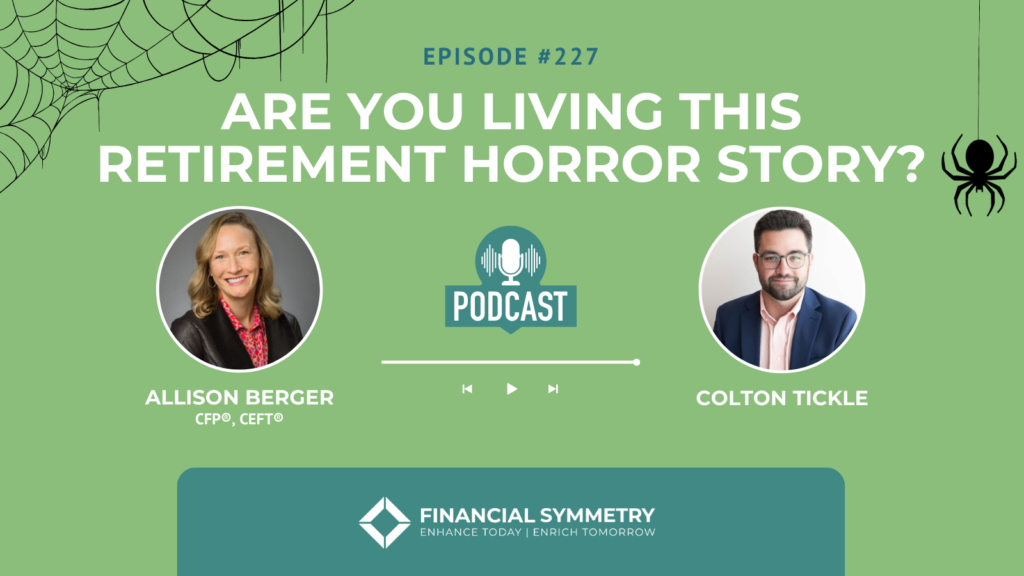Investing can feel like a battle between two polar opposites within us, the rational and the emotional, just like the classic story of Dr. Jekyll and Mr. Hyde. This week we’re talking you through the spooky tale of the risks, emotions, and rational strategies involved in long-term investing.
Lessons in Investing from Dr. Jekyll and Mr. Hyde
We all tend to think we’re a little more rational than we really are with our investment behaviors, but in reality, there are lots of factors—internal and external—that impact how we invest. Dr. Jekyll, well-educated, methodical, and rational, embodies the disciplined long-term investor. He invests in an 80/20 globally diversified portfolio, making the maximum contributions to his 401(k) each year, including catch-up contributions after age 50. On the other hand, Mr. Hyde represents a more volatile, risk-averse personality who stockpiles cash, craving security and control but missing out on market opportunities.
We dig into the outcomes of their differing strategies. Over a 30-year period, Dr. Jekyll ended up with around $1.7 million, while Mr. Hyde wound up with just $650,000. Despite enduring market downturns like the tech bubble and the Great Financial Crisis, Dr. Jekyll’s long-term strategy paid off handsomely compared to Mr. Hyde’s low-risk approach. Their story illustrates the importance of staying the course and committing to a well-thought-out investment strategy, even when short-term conditions seem volatile.
Challenges and Rewards of Long-Term Investing
Long-term investing can often feel like an emotional rollercoaster.
Dr. Jekyll’s investment strategy is characterized by a rational, well-educated, and methodical approach. He opts for a long-term investment horizon spanning 30 years to his retirement at 65. He consistently maxes out his 401(k) contributions, including catch-up contributions after age 50. True to his rational nature, Dr. Jekyll maintains a globally diversified portfolio comprised of approximately 80% stocks and 20% fixed income, aiming for balanced growth while mitigating risk.
This consistent and disciplined strategy allows Dr. Jekyll to navigate various financial crises and market volatility over the decades. His commitment to the growth-oriented, diversified portfolio ultimately leads to substantial wealth accumulation, illustrating the benefits of maintaining a long-term perspective in investing.
In contrast, Mr. Hyde stockpiles cash, prioritizing security over potential growth. This cautious strategy involves investing exclusively in 3-month Treasury bills (T Bills), allowing him to maintain control and avoid the emotional turmoil of market fluctuations. However, this safer route leads to significantly lower returns over the long term. While Dr. Jekyll’s rational strategy amassed approximately $1,700,000 over 30 years, Mr. Hyde’s conservative approach yielded only about $650,000.
Choose the rational, long-term path of Dr. Jekyll over the volatile, risk-averse nature of Mr. Hyde, and you’ll be moving toward a secure and financially comfortable retirement.
Crafting a Rational, Long-Term Investment Strategy
To avoid the pitfalls of emotional decision-making, you can take these actionable steps:
Automate savings and investment strategies to reduce the temptation of making emotional decisions during market volatility.
Review and adhere to a comprehensive financial plan regularly. Your long-term goals should dictate your investment strategy, not market noise.
During market downturns, look for opportunities to invest more. Contributions to Roth IRAs or 401(k)s during market dips can significantly enhance long-term returns.
Resist the temptation to stockpile cash and instead take disciplined steps toward growing your investment portfolio. Don’t let yourself be distracted from your financial goals by sensationalist news and fluctuating markets! When you stay committed to a goal-based investment strategy you’ll end up reaping the rewards.
This disciplined approach, just like Dr. Jekyll’s methodical nature, gives you a strong foundation for successfully weathering the inevitable volatility and uncertainty in financial markets.
Outline of This Episode
[03:06] Dr. Jekyll and Mr Hyde’s wildly different investment strategies
[06:00]Strategies that help mitigate emotional reactions during elections and global crises
[07:38] Balancing short-term market volatility with a long-term investment perspective
[10:37] How to stay aligned with long-term goals in the face of market downturns
[13:28] Diversification to manage risk in an investment portfolio
[14:17] Psychological factors that cause investors to feel more confident during market upswings
[15:35] Automating your investment and savings strategy to prevent emotional decision-making
